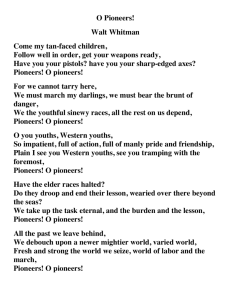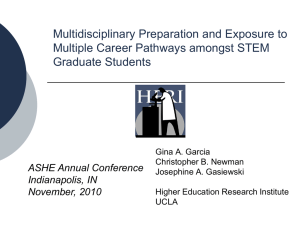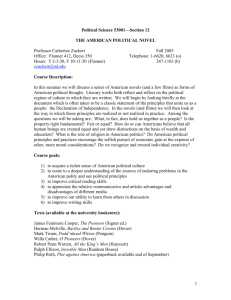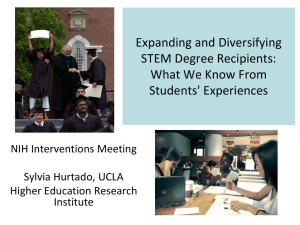Pioneering individuals in STEM and institutional agents.
advertisement
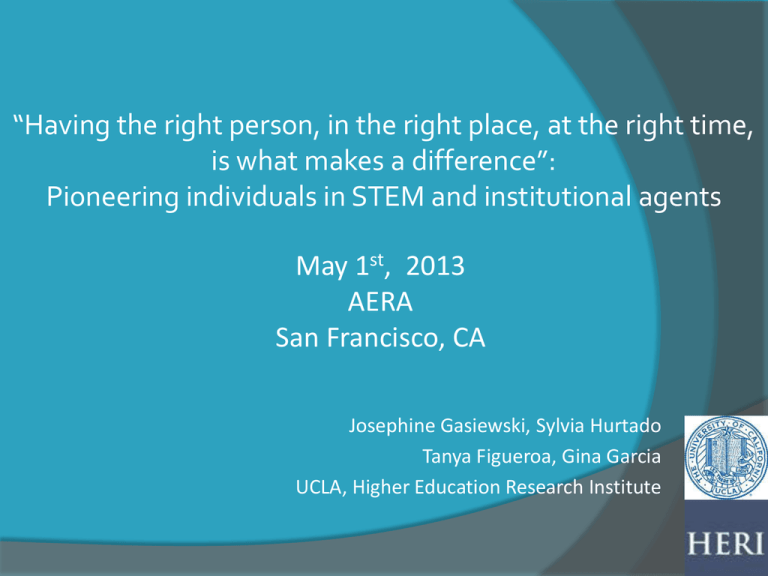
“Having the right person, in the right place, at the right time, is what makes a difference”: Pioneering individuals in STEM and institutional agents May 1st, 2013 AERA San Francisco, CA Josephine Gasiewski, Sylvia Hurtado Tanya Figueroa, Gina Garcia UCLA, Higher Education Research Institute Introduction • U.S. needs to produce roughly 1 million more STEM professionals • Many efforts devoted to increasing STEM retention in college • Few studies look at retention efforts from the perspective of those implementing them • Much can be learned from the professionals who have dedicated careers to diversifying STEM and to tearing down barriers Purpose Understand how “pioneers” have: • Been helped by others in their educational journeys • Acted in ways that help URM students achieve in STEM • Helped students become agents of change • Overcome barriers Who qualifies as a “pioneer”? Purposeful sampling, sampling criteria: • longevity and success in STEM • national recognition • historical underrepresentation in their field • evidence of a long-term commitment to diversifying STEM Identified through: • professional organizations • lists of awardees receiving national recognition for their diversity efforts • National Institutes of Health funded programs focused on improving minority access to research careers • snowball sampling Methodology 32 semi-structured, in-depth interviews: • 9 biomedical/behavioral sciences, 12 physical sciences/engineering, & 11 program administrators. • 50% women • 9 Black, 14 Latina/o, 3 American Indian, 4 White, 1 Biracial, and 1 African Coding: open coding for emergent themes axial coding inter-coder reliability development of coding architecture in NVivo9 coding to nodes Theoretical Foundation Social capital framework proposed by Stanton Salazar (2011) • notion of institutional agents and how they leverage their social capital to combat the structural challenges faced by students of color Mertens’ transformative paradigm (2005) • emphasizes human rights and social justice, acknowledges social power and privilege, and advocates for the use of culturally appropriate research methods aimed at action and social change How did past agents help pioneers? This person who noticed that I could do it, that had encouraged me; he encouraged me into the area of physics because he was a physicist...He was still pushin' and supporting me…. There's nothing I can say that would do him justice except that he was brilliant… He saw something of that in me and wanted to transfer it. How did past agents help pioneers? In graduate school I had one or two faculty whom I could go to with whatever problem I had, I could go talk to them about. I could go to my teachers…at every level in my career, that is—I had a teacher, at least one, sometimes two or three that I felt comfortable enough with to go and talk to about stuff other than my class work. How did pioneers act as agents? The question I guess I would always have is who helps move the student from one person to the next person to the next person to the next person? If you go back far enough among African American scientists, you will find that they were sent to a graduate program by their undergraduate person... [Students] were sent to that other person or that program because of the confidence that their undergraduate faculty member had that that graduate person was not going to mess over that student and was really going to nurture them and give them what they needed and that they were not going to underestimate that capacity. How did pioneers act as agents? What can you do to structure… opportunities so that you can broaden the net and include more people?...Telling the student that you think has talent, and say, “Look, here’s this opportunity, why don’t you apply and show me your application and I can help you reach it?” How do pioneers create future agents? We want to produce white students who've had a chance to think about issues of under-representation. How many professors have thought about it when they were in undergrad school? It's rare. How many doctors have had a chance to think about it? My students—how many of my are now are in faculty positions leading diversity efforts? A lot, all over. You know? How do pioneers create future agents? We ran this program where we have study sessions for the students…It was amazing to go into that room—just walk in some evenings and see how much peer counseling and peer mentoring was going on in the room. They were teaching each other. Not only did we create that kind of synergy among students, but we also created leaders. They didn't even know was happening to them. They did not even understand what was happening to them. That supportive environment that we gave them to allow them to do that—they created their leadership themselves. Their own leadership skills and it wasn't anything that I did. It was what—all I did was create the environment for it to happen. How did pioneers overcome barriers? First off, when I was younger, I didn’t understand. The successful scientist has some attributes that I did not have. One is the ability to talk about yourself and essentially to brag, what I would call bragging about your abilities. I have learned to do that. Another trait is the ability to defend yourself and to be fairly aggressive. I have learned to do that. Those were not things I was comfortable with. To be recognized as a successful scientist in a male-dominated culture and physics is still heavily male dominated, I had to learn how to behave in a different way. How did pioneers overcome barriers? I said, well okay, maybe I do have something to contribute here, and it’s by doing it and by having some success. Success never comes all at once, you build up to it and it’s incremental, having a whole bunch of little successes. Also, I think learning from the non-successes, that helped a lot, too. I think we’re always aware of the messages that we’re getting from the larger society that minority folks can’t do, but then there’s also something that, I think, that we push back. They say, what are you talking about? Of course we can. Discussion/Conclusion Pioneers cared about students’ and empowered them with information • Inserted selves in institutional/national positions in order to: • • Challenge status quo • Broaden access to opportunity structure • Change definition of who was capable of doing STEM Remind us that we must focus on developing talent rather than weeding out students • Creating social change was not without risk • Next Steps? • • More change is needed and possible! We must involve more people at all institutional levels Contact Information Faculty/Co-PIs: Sylvia Hurtado Kevin Eagan Mitchell Chang Postdoctoral Scholar: Josephine Gasiewski Administrative S taff: Dominique Harrison Graduate Research Assistants: Tanya Figueroa Juan Garibay Gina Garcia Bryce Hughes Papers and reports are available for download from project website: http://heri.ucla.edu/nih Project e-mail: herinih@ucla.edu This study was made possible by the support of the National Institute of General Medical Sciences, NIH Grant Numbers 1 R01 GMO71968-01 and R01 GMO71968-05, the National Science Foundation, NSF Grant Number 0757076, and the American Recovery and Reinvestment Act of 2009 through the National Institute of General Medical Sciences, NIH Grant 1RC1GM090776-01. This independent research and the views expressed here do not indicate endorsement by the sponsors.
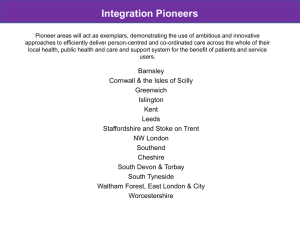
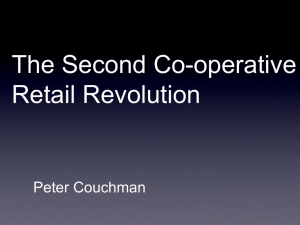
![Pioneers! O Pioneers! [excerpt] (1865)](http://s3.studylib.net/store/data/009625303_1-97477e83c178760551e424da5296a509-300x300.png)
